Main Costs When Selling Property
Keep up-to-date with all the latest property news & updates.

If you own property, it’s probably your most valuable asset - one you can make even more valuable over time, through modernisations and extensions.
However, if you’re planning to sell, it’s important not only to think about the value of the property but the costs incurred throughout the selling process. Here are the details about the three main sources of costs, and what you need to take into account for each.
Estate Agent Costs
Enlisting an estate agent is a complex business that includes both benefits and costs. There's an ongoing debate about whether their services provide good value for money, or whether it’s smarter to just tackle the market by yourself.
At the present time, however, most sellers still opt to enlist one. For the fee they charge you, the estate agent will spread the word about your property, liase with interested parties, arrange and conduct viewings of the property, negotiate with buyers over the sle price, and deal with the paperwork associated with the sale.
How much should you expect to pay?
That all comes down to where you live, what your property is worth, and how much of the above services you want your estate agent to provide. There’s also a choice to be made between paying a percentage sale price fee and negotiating for a fixed fee.
Taxation Costs
If you’re selling a property that you don’t count as your main home, then that property is an asset that is thereby eligible for Capital Gains Tax. This type of tax becomes relevant any time to dispose of an asset, even if you give it to someone as a present or arrange to swap properties.
As for the specific expense involved, the amount that you have to pay will be the difference between what you paid for the property and the money you receive when selling it. This will be around 18% for the average taxpayer selling a residential home or flat, 20% if you’re representing someone after their death, and closer to 30% if you are a seller in a higher tax bracket.
However, it’s not all bad news - there are some tax-free allowances each year. For example, recent sellers only had to pay Capital Gains Tax if their gains breached the threshold of £11,000 (though this amount varies by year).
Building Works Costs
Finally, almost all sellers find that they need to spend money improving a property and/or its grounds before it goes on the market. For example, if your property is obviously in need of repairs, is simply rundown or has a messy garden, all of these things will reduce interest in your property - and ultimately reduce its value on the market.
It’s also worth making improvements that aren’t necessary but that boost value - for example, modern fixtures and decor. However, it is structural repairs that matter the most, as when selling the property you’ll need to pass on documentation that proves the property has no known problems.
Opting For A Quick Cash Sale
Instead Sometimes, when you add up all of the above, you find that the costs associated with selling your property in the traditional way are just too excessive. In such cases, it’s well worth considering a quick cash buyer instead - like us.
We’ll conduct a valuation on your property so that we can offer you the very best possible price, and then we’ll take care of the rest. No estate agents, no repairs, no redecoration and no time wasted - just a fast, effective sale and the freedom to start afresh.
Date: 05/01/21

